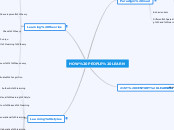HOW PEOPLE LEARN
Constructivism
Social cognitivism
Radical constructivism
Personal constructivism
Cognitive constructivism
Behaviourism
Different paradigms fit different teaching and learning worlds
Connectivism
How we learn with technology
Video based learning
The videos bring life to teaching and learning
Lack of proper tools to integrate videos still a barrier
multimedia
It is encouraged
The general understanding is that learners are unique individuals
Not everyone is on board
Makerspsces
Under consideration
Learners will use 3D printers
learners' creative juices will be under the spotlight
Gaming and gamification
A colleeague has a project on gamification
Digital literacy
a compulsory module for all students
Testing done online
Assessment & Evaluation
The connected world is slowly becoming a reality
The world is becoming flat with no boundaries
The majority of learners have basic tools for connection e.g cellphones
Activity theory
Motivation and learning theory
Maslow's theory tied to human rights
Internal versus external motivation in our classrooms a common occurence
Cognitive development theory
The uniqueness in how students learn is considered
Timing and accomodation of learners who learn at different paces is considered
Assessment always take the leaners difference into consideration
Chaos theory
Social learning theory
Learners are understood t be unique
Learners are understood to be influenced by the society from which they come
Bloom's taxonomy
Improvements in how teaching and learning occur
The new version has assisted learners to be creators of content
situated cognition
Authentic learning
The exploration of technology to bring real-world to the classroom takes place
Visual learning style
Classroom are made of different artifacts to accomodate differences in learning
Problem based learning
Generational learning
The issue of digital natives versus digital immigrants is alive
The teacher- learner relationship needs a common ground
Collaborative learning
Androgogy
It is about preparing learners on the journey to adulthood
Metacognition
Biological and secondary knowledge
Each lesson must tsake prior knowledge into consideration
